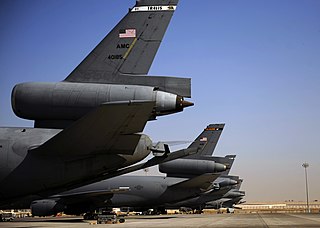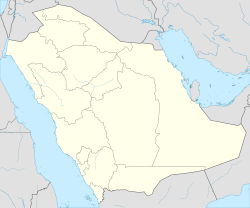
The McDonnell DouglasF-15E Strike Eagle is an American all-weather multirole strike fighter derived from the McDonnell Douglas F-15 Eagle. The F-15E was designed in the 1980s for long-range, high-speed interdiction without relying on escort or electronic-warfare aircraft. United States Air Force (USAF) F-15E Strike Eagles can be generally distinguished from other US Eagle variants by darker aircraft camouflage, conformal fuel tanks (CFTs) mounted along the engine intake ramps and a tandem-seat cockpit.

The Royal Saudi Air Force (RSAF) is the aviation branch of the Saudi Arabian Armed Forces.

King Abdulaziz Air Base, also known as Dhahran Air Base and formerly Dhahran International Airport, Dhahran Airport and Dhahran Airfield, is a Royal Saudi Air Force base located in Dhahran in the Eastern Province, Saudi Arabia. Located west of Thuqbah and 7 km (4 mi) southeast of the Saudi Aramco Dhahran Camp, the airbase was the first Saudi Arabian airport to be constructed, in 1961, and is under the command of Air vice-marshal Prince Turki bin Bandar bin Abdulaziz Al Saud.

Al Udeid Air Base is one of two military bases southwest of Doha, Qatar, also known as Abu Nakhlah Airport.

Operation Southern Watch was an air-centric military operation conducted by the United States Department of Defense from August 1992 to March 2003. Suggest Verification against <https://en.wikipedia.org/wiki/United_States_Navy_order_of_battle_of_the_Gulf_War#Units_in_Operation_Southern_Watch_(1991-2003)>, which states 1991. USS Stein participated in exercises off the coast of Oman during this time to repel Iraqi Gunboat Threats.
Gastonia Municipal Airport is a city-owned, public-use airport located four nautical miles south of the central business district of Gastonia, a city in Gaston County, North Carolina, United States. It is included in the National Plan of Integrated Airport Systems for 2011–2015, which categorized it as a general aviation facility.

The 484th Air Expeditionary Wing is a provisional United States Air Force unit assigned to Air Combat Command. It may be activated or inactivated at any time. It was activated and attached to United States Air Forces Central for the invasion of Iraq in 2003. It was headquartered at Prince Sultan Air Base, Saudi Arabia.

The 125th Fighter Wing is a unit of the Florida Air National Guard, stationed at Jacksonville Air National Guard Base, Florida. If activated to federal service with the United States Air Force, the 125 FW is operationally gained by the Air Combat Command (ACC).

The 363d Intelligence, Surveillance and Reconnaissance Wing is a United States Air Force unit. The wing is assigned to the United States Air Force Sixteenth Air Force, stationed at Joint Base Langley-Eustis, Virginia.

The 378th Air Expeditionary Wing is a provisional United States Air Forces Central Command unit assigned to Air Combat Command. As a provisional unit, it may be activated or inactivated at any time.

The 908th Expeditionary Air Refueling Squadron is a provisional United States Air Force (USAF) unit. It is assigned to the 378th Air Expeditionary Wing at Prince Sultan Air Base in Saudi Arabia. It has supported combat operations in the War in Afghanistan (2001–2021), Iraq, and Syria from its previous location of Al Dhafra Air Base in the United Arab Emirates. The squadron has a varied background, having been formed by a series of consolidations of no fewer than five distinct units.

The 4404th Wing (Provisional) is an inactive United States Air Force unit. It was last was assigned to the Air Combat Command (ACC), stationed at Prince Sultan Air Base, Saudi Arabia.
No. 24 Squadron RSAF is a squadron of the Royal Saudi Air Force that operates the Airbus A330-203 MRTT and A330-243 MRTT from Prince Sultan Air Base, Al-Kharj, Riyadh Province in Saudi Arabia within RSAF 6 Wing.

The 968th Expeditionary Airborne Air Control Squadron is a provisional unit of the United States Air Force, flying the Boeing E-3G Sentry. Since March 2022, the squadron is stationed at Prince Sultan Air Base, Saudi Arabia. It has been activated twice since the September 11 terrorist attacks.
No. 18 Squadron RSAF is a squadron of the Royal Saudi Air Force that operates the Boeing E-3A Sentry at Prince Sultan Air Base, Al-Kharj, Riyadh Province in Saudi Arabia within RSAF 6 Wing.
No. 19 Squadron RSAF is a squadron of the Royal Saudi Air Force that operates the Beech 350ER-ISR, Boeing RE-3A and the Boeing RE-3B at Prince Sultan Air Base, Al-Kharj, Riyadh Province in Saudi Arabia within RSAF 6 Wing.
No. 23 Squadron RSAF is a squadron of the Royal Saudi Air Force that operates the Boeing KE-3A at Prince Sultan Air Base, Al-Kharj, Riyadh Province in Saudi Arabia within RSAF 6 Wing.
No. 32 Squadron RSAF is a squadron of the Royal Saudi Air Force that operates the Lockheed KC-130H Hercules and the KC-130J Hercules at Prince Sultan Air Base, Al-Kharj, Riyadh Province in Saudi Arabia within RSAF 6 Wing.
No. 60 Squadron RSAF is a squadron of the Royal Saudi Air Force that operates the Saab 2000AEW&C at Prince Sultan Air Base, Al-Kharj, Riyadh Province in Saudi Arabia within RSAF 6 Wing.
No. 17 Squadron RSAF is a squadron of the Royal Saudi Air Force that operates various aircraft at Prince Sultan Air Base, Al-Kharj, Riyadh Province in Saudi Arabia within RSAF 6 Wing.

















